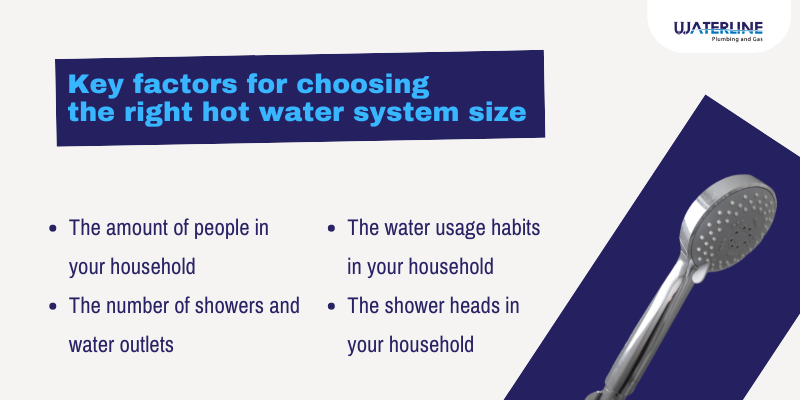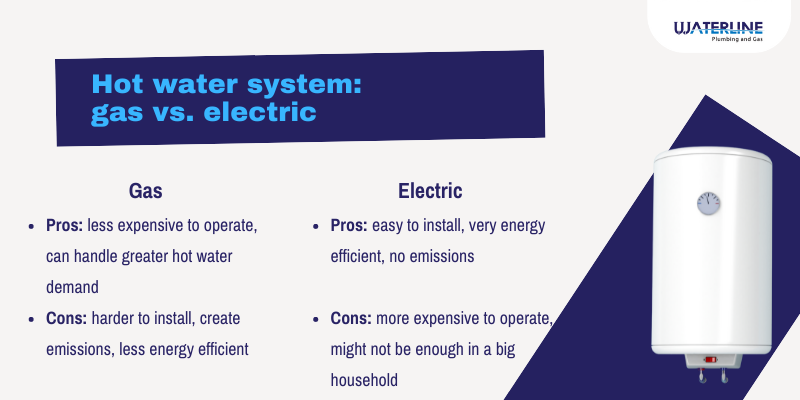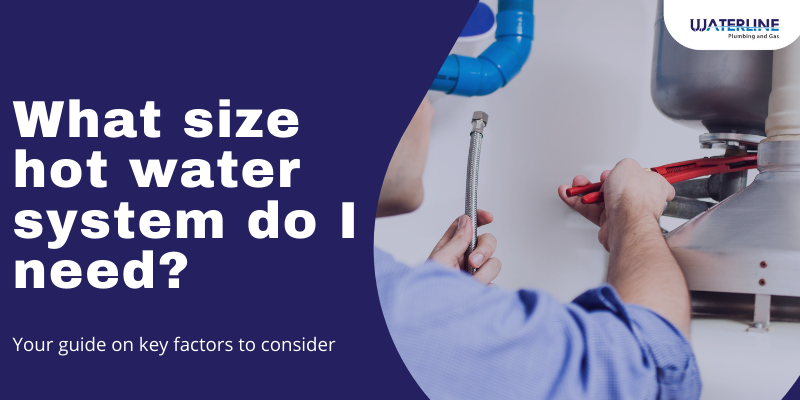If you’re anything like most Australians, you probably don’t pay too much attention to your hot water system until there’s a problem. So, when your old system inevitably dies, or you’re looking to fit out a new property, you’re likely wondering “What size hot system do I need?”. If you’ve found yourself baffled by hot water system sizes – you’re not alone. Waterline Plumbing are here to outline the different hot water systems available, how to find the right tank size for your property, and the factors that can influence which size you should install.
How big a hot water system do I need?
When it comes to purchasing and installing a new hot water system, size really does matter. If you choose a system that is too small, it may not meet the hot water demands of your family, resulting in at least one cold shower a night! Similarly, a hot water system that is too large is a waste of money, as the unit will maintain the same water temperature, whether it’s used or not. The more water is stored in your hot water system, the more energy you’ll be using to maintain water temperatures. In essence, it’s important to find that sweet spot – where the system will cover your household’s needs, but will not be storing considerably more water than required.

Factors to consider when looking at hot water system sizes
Choosing the right hot water system size is about finding the balance between capacity, household needs, and efficiency. As such, it’s important to consider these key factors when determining the right hot water system size for your household.
1. Number of residents
A visible water pipe leak would be the one under a sink. However, broken water pipes, which you can hear through the Household members is the most obvious factor when it comes to answering the question of “How big of a hot water system do I need?”. In order to determine the right size of your hot water system, you need to determine how many people are going to be using hot water, and at what rate. And it’s not just about how many showers are taken each day – we also need to consider hot water usage in the bathroom, kitchen, and laundry.
2. Hot water outlets
In some cases, all that is required is a pipe replacement. This wAnother key consideration is how many showers, sinks, and other hot water outlets there are in the household. This is an important vital to understanding your hot water demands. For example, a house with a single shower will not require the same hot water on demand as a house with multiple showers, bathrooms, a laundry, and kitchen area that will need to be used at the same time. With a single shower, the boiler is provided with more time to heat new hot water while in use.
3. Water usage habits
Not every person in a single household will have the same routines and water usage habits. As such, it is important to consider all water usage habits when choosing a hot water system. When we’re talking about water usage habits, we’re not only talking about who likes to take long showers and who uses the dishwasher, but also when hot water is used. For example, if multiple household members are taking showers in the morning, this may demand a larger hot water tank than if some were showering at night, and some in the morning.
4. Type of hot water system
When there is a busted water pipe, one of the first signs is if there is a brownish tint to your water. This discolouration Another major consideration on for water systems is the energy source that you want to rely on to heat the water up. There are two common ways of heating your water: electricity and gas. Both come with a variety benefits and will be more suitable for different households.
Electric hot water Systems
Another immediate sign of a broken water pipe is when the water pressure changes. It may seem like barely any water iElectric hot water systems are known for providing a more efficient solution when compared to gas hot water systems. Electric units are also easier to install and will not contribute emissions while in use. However, electric systems tend to be more expensive to operate than gas systems. In terms of hot water system sizes, depending on the size of your family, an electric heater may not supply enough hot water for a big household.
Gas hot water systems
Gas hot water systems are generally less expensive to operate than electric systems. However, gas hot water systems are becoming more costly to run over time.
Gas systems can handle a greater hot water demand – they are quicker when it comes to heating water up and providing a consistent flow of hot water. The drawbacks of a gas system are that they are more difficult to than electric systems, and are not as environmentally friendly as electric or solar hot water systems.
If you’re interested in learning more about gas vs. electric hot water systems, get in touch with the friendly team at Waterline Plumbing for an expert to help you make your decision.

Determining the right hot water tank size for a family of 5
To answer the question of “What size of a hot water system do I need for my household?”, our advice is to observe the water usage of your household over a period of time, during normal work and school weeks. Two weeks will give you a good idea of how much water your household requires.
Generally speaking, for a family of 5, you will require a hot water system in the 230-300L range. However, we recommend engaging the services of your local Perth Plumber who can get a better idea of your requirements and provide a more accurate assessment.
The experts Waterline Plumbing are here to help you make the right decision on your next hot water system. Have you got further questions about hot water system sizes? Call 0450 334 373 or submit an online enquiry today.

